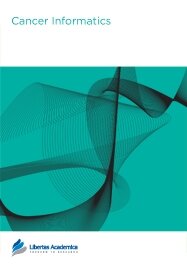

Publication Date: 17 Feb 2011
Type: Methodology
Journal: Cancer Informatics
doi: 10.4137/CIN.S6631

Aberrant microRNA activity has been reported in many diseases, and studies often find numerous microRNAs concurrently dysregulated. Most target genes have binding sites for multiple microRNAs, and mounting evidence indicates that it is important to consider their combinatorial effect on target gene repression. A recent study associated the coincident loss of expression of six microRNAs with metastatic potential in breast cancer. Here, we used a new computational method, miR-AT!, to investigate combinatorial activity among this group of microRNAs. We found that the set of transcripts having multiple target sites for these microRNAs was significantly enriched with genes involved in cellular processes commonly perturbed in metastatic tumors: cell cycle regulation, cytoskeleton organization, and cell adhesion. Network analysis revealed numerous target genes upstream of cyclin D1 and c-Myc, indicating that the collective loss of the six microRNAs may have a focal effect on these two key regulatory nodes. A number of genes previously implicated in cancer metastasis are among the predicted combinatorial targets, including TGFB1, ARPC3, and RANKL. In summary, our analysis reveals extensive combinatorial interactions that have notable implications for their potential role in breast cancer metastasis and in therapeutic development.
PDF (1.68 MB PDF FORMAT)
RIS citation (ENDNOTE, REFERENCE MANAGER, PROCITE, REFWORKS)
Supplementary Files 1 (69.17 KB ZIP FORMAT)
BibTex citation (BIBDESK, LATEX)
XML
PMC HTML
Cancer Informatics has become an increasingly important source for research in the methodology of cancer genomics and the novel use of informatics technology. I have been impressed by the journal's contents and have been very gratified by the number of accesses to my recent publication. Cancer Informatics has filled an important gap in cancer research journals.

All authors are surveyed after their articles are published. Authors are asked to rate their experience in a variety of areas, and their responses help us to monitor our performance. Presented here are their responses in some key areas. No 'poor' or 'very poor' responses were received; these are represented in the 'other' category.See Our Results
Copyright © 2013 Libertas Academica Ltd (except open access articles and accompanying metadata and supplementary files.)
FacebookGoogle+Twitter
PinterestTumblrYouTube